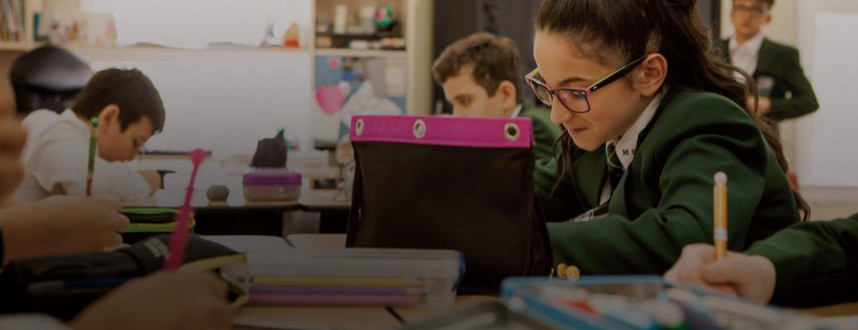
When a student reaches the Upper Elementary Program at MSK they have established a strong foundation and are ready to springboard into developing more advanced skills in abstract thinking with sophisticated learning tools. Following Lower Elementary programming, students will strengthen their academic rapport while displaying independence and responsibility. In Upper Elementary we continue to offer a solid academic curriculum with enriched learning experiences and extracurriculars.
Students continue to engage in mathematics through hands-on activities as they study the foundations of formulas, which they later apply to real-world experiences. Similarly to Lower Elementary programming, students are learning about “why” and “how” information can be applied in various situations. While students in Upper Elementary are continuing to develop their abstract learning, they can also expect to learn concrete mathematical skills as per provincial Ministry of Education guidelines.
Also, geometry receives a special focus in Upper Elementary as a continuation from Lower Elementary programming. Students study and explore transitivity, insets of equivalences, as well as area and perimeter of shapes. It is through this approach that gives Montessori students an advantage — taking what they have learned and applying it to the world around them in order to make deeper connections and solid comprehension.
Language is the foundation of learning in Upper Elementary classrooms as it encompasses all areas of the curriculum. Language studies are intertwined within all subject areas and students are always encouraged to utilize these skills through their work. Students are keen on the “writing process” and utilize it to generate work that is cohesive and well-written. Grammar and spelling are foundational areas of learning but students are encouraged to use different mediums while creating a wide array of projects, plays and art to meaningfully translate what they have learned.
In Upper Elementary, cultural subjects such as botany, zoology, history, geography, science and technology, all encompass this area of studies. Students will learn what is appropriate and expected to as per provincial Ministry of Education guidelines and beyond. It is through the Montessori methodology that takes cultural studies to the “next level” as students are at an advantage by learning more about the world around them than what is expected for these grades.
Students continue to engage in mathematics through hands-on activities as they study the foundations of formulas, which they later apply to real-world experiences. Similarly to Lower Elementary programming, students are learning about “why” and “how” information can be applied in various situations. While students in Upper Elementary are continuing to develop their abstract learning, they can also expect to learn concrete mathematical skills as per provincial Ministry of Education guidelines.
Also, geometry receives a special focus in Upper Elementary as a continuation from Lower Elementary programming. Students study and explore transitivity, insets of equivalences, as well as area and perimeter of shapes. It is through this approach that gives Montessori students an advantage — taking what they have learned and applying it to the world around them in order to make deeper connections and solid comprehension.
Language is the foundation of learning in Upper Elementary classrooms as it encompasses all areas of the curriculum. Language studies are intertwined within all subject areas and students are always encouraged to utilize these skills through their work. Students are keen on the “writing process” and utilize it to generate work that is cohesive and well-written. Grammar and spelling are foundational areas of learning but students are encouraged to use different mediums while creating a wide array of projects, plays and art to meaningfully translate what they have learned.
In Upper Elementary, cultural subjects such as botany, zoology, history, and geography all encompass this area of studies. Students will learn what is appropriate and expected to as per provincial Ministry of Education guidelines and beyond. It is through the Montessori methodology that takes cultural studies to the “next level” as students are at an advantage by learning more about the world around them than what is expected for these grades.


